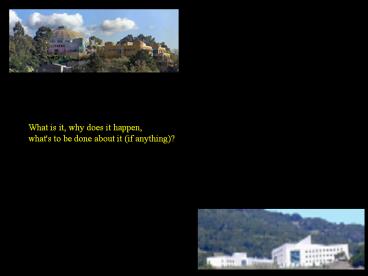AGING - PowerPoint PPT Presentation
Title:
AGING
Description:
AGING . What is it, why does it happen, what's to be done about it (if anything)? What IS Aging? Scientifically . Aging is a biological process Aging not ... – PowerPoint PPT presentation
Number of Views:75
Avg rating:3.0/5.0
Title: AGING
1
AGING .
What is it, why does it happen, what's to be done
about it (if anything)?
2
What IS Aging?
3
Scientifically .
Aging is a PROCESS that converts an optimally
healthy, fit organism (for its environment) into
a less healthy, less fit organism
Aging is a biological process Aging not disease,
per se
4
Practically .
Aging reduced tissue/physiological function
Aging increased susceptibility to
disease (age-related diseases)
Aging decreased resistance to stress (physical
and psychological)
5
Why does this happen? (Why do we age? If we
don't understand this, we haven't hope of doing
something about it!) What can we do about it?
(How can we postpone aging)
6
WHY do we age? Genes Environment
7
Why do we age --- GENES
Genes determine species-specific life span
(LAGs) (e.g., mice, monkeys, humans, tortoises)
Genes determine differences among individuals
within a species (e.g., big/small noses) (genetic
polymorphisms)
8
Species-specific longevity genes
Flies (Drosophila melanogaster) Nematodes
(Caenorhabditis elegans) Mice (Mus
musculus) Humans (Homo sapiens) Galapagos turtles
(Geochelone elephantopus)
Life spans ranging from 2-3 weeks to 100-200
years!
9
AGING in MICE AND MEN
MICE
HUMANS
Fitness Disease (Cancer, osteoporosis,
diabetes, etc.)
AGE (log)
Mice and Humans are 97 genetically similar!
10
Species-specific longevity genes
What are the genes that determine why mice live
lt4 years, whereas humans live gt100 years?
Potentially big pay-off, but complicated by
development/evolution
11
Individual longevity genes (polymorphisms)
Smaller pay-off, but possibly amenable to
intervention (environment, life style, drugs??)
12
Individual longevity genes
Most identified so far are disease-susceptibility
genes (e.g., ApoE4)
Solution preventive drugs
Healthy centenarian studies are underway!
Solution ??????
13
Why do we age --- ENVIRONMENT
Present environment (including life style)
Past environment (evolutionary history)
14
Why do we age --- PRESENT ENVIRONMENT
DIET (a brief discourse about calorie restriction)
EXERCISE
THINK GOOD THOUGHTS! (a brief discourse about
stress/hormesis)
15
FOOD ---gt ENERGY
Food ----gt simple molecules oxygen
(mitochondria) ----gt energy
Oxygen metabolism ----gt damaging byproducts (ROS,
oxidative stress)
Anti-oxidant defenses good, but not
perfect (differ among species)
OPTIMAL food less ROS, less damage, more
defenses longer lifespans!
16
DIET
CALORIC RESTRICTION
GOOD NEWS! 30-40 calorie restriction without
malnutrition extends HEALTHY lifespan
40-50 (worms, flies, mice, rats -- maybe
monkeys)
BAD NEWS! Life SEEMS longer!! (let's develop that
CR pill)
17
EXERCISE
Yes, yes, yes .. (but not too much)
Exercise ---gt healthier muscles, greater fitness
Greater protection from oxidative stress! (not
such a paradox, anti-oxidant defenses)
18
Think good thoughts! Avoid undue stress
Physiological stress Stress hormones, a double
edged sword
Physical stress Overwhelm cellular defense
mechanisms
The peculiar phenomenon of hormesis
19
HORMESIS --- (a little stress is good for you!)
Low level stress high stress ---gt Less damage
by high stress
Low level stress ---gt Longer life span
Temperature stress, chemicals, radiation, etc
20
Why do we age --- PAST ENVIRONMENT
Genes evolve in response to environment
This is REALLY why we age!
21
(No Transcript)
22
Mutation Accumulation ("bad" genes can persist)
Antagonistic Pleiotropy (what's good when you're
young can be bad when you're old)
23
GOOD NEWS! If we keep our "protected"
environment, we WILL evolve longer life spans!
BAD NEWS! It's going to take a LONG time!
24
Sooo. What's to be done about aging now?
Optimize present environment
New therapies on the horizon! Cell based
therapies Drug based therapies
Support basic research in aging!
25
Cell based therapies
Stem cells! embryonic adult nuclear
transplant (cloning)
Telomerase! increase cell divisions
anti-cancer therapy
26
Drug-based therapies
Anti-oxidants, mitochondrial protectors, etc.
Hormones! growth hormone insulin/IGF
(lessons from worms and flies) estrogen
CR mimetics!
27
AGING ..
Long, healthy life spans (it's already happening)
Treatments for age-related diseases (it's already
happening)
Limits -- not yet reached (we've still a long way
to go)































